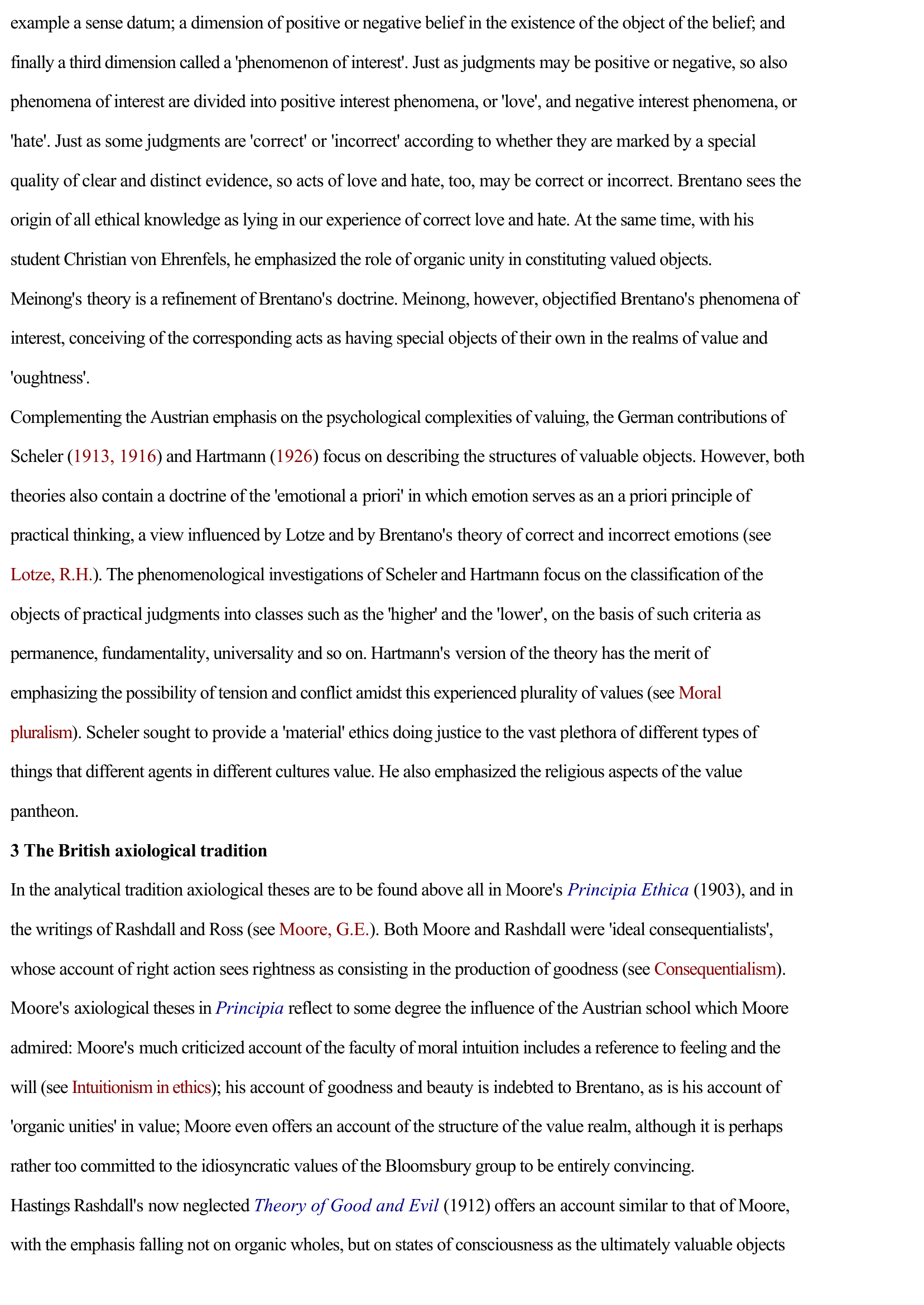Axiology
Publié le 22/02/2012

Extrait du document
«
example a sense datum; a dimension of positive or negative belief in the existence of the object of the belief; and
finally a third dimension called a 'phenomenon of interest' .
Just as judgments may be positive or negative, so also
phenomena of interest are divided into positive interest phenomena, or 'love' , and negative interest phenomena, or
'hate' .
Just as some judgments are 'correct' or 'incorrect' according to whether they are marked by a special
quality of clear and distinct evidence, so acts of love and hate, too, may be correct or incorrect.
Brentano sees the
origin of all ethical knowledge as lying in our experience of correct love and hate.
At the same time, with his
student Christian von Ehrenfels, he emphasized the role of organic unity in constituting valued objects.
Meinong 's theory is a refinement of Brentano 's doctrine.
Meinong, however, objectified Brentano 's phenomena of
interest, conceiving of the corresponding acts as having special objects of their own in the realms of value and
'oughtness' .
Complementing the Austrian emphasis on the psychological complexities of valuing, the German contributions of
Scheler ( 1913, 1916 ) and Hartmann ( 1926 ) focus on describing the structures of valuable objects.
However, both
theories also contain a doctrine of the 'emotional a priori' in which emotion serves as an a priori principle of
practical thinking, a view influenced by Lotze and by Brentano 's theory of correct and incorrect emotions (see
Lotze, R.H. ).
The phenomenological investigations of Scheler and Hartmann focus on the classification of the
objects of practical judgments into classes such as the 'higher' and the 'lower' , on the basis of such criteria as
permanence, fundamentality, universality and so on.
Hartmann 's version of the theory has the merit of
emphasizing the possibility of tension and conflict amidst this experienced plurality of values (see Moral
pluralism ).
Scheler sought to provide a 'material' ethics doing justice to the vast plethora of different types of
things that different agents in different cultures value.
He also emphasized the religious aspects of the value
pantheon.
3 The British axiological tradition
In the analytical tradition axiological theses are to be found above all in Moore 's Principia Ethica (1903), and in
the writings of Rashdall and Ross (see Moore, G.E. ).
Both Moore and Rashdall were 'ideal consequentialists' ,
whose account of right action sees rightness as consisting in the production of goodness (see Consequentialism ).
Moore 's axiological theses in Principia reflect to some degree the influence of the Austrian school which Moore
admired: Moore 's much criticized account of the faculty of moral intuition includes a reference to feeling and the
will (see Intuitionism in ethics ); his account of goodness and beauty is indebted to Brentano, as is his account of
'organic unities' in value; Moore even offers an account of the structure of the value realm, although it is perhaps
rather too committed to the idiosyncratic values of the Bloomsbury group to be entirely convincing.
Hastings Rashdall 's now neglected Theory of Good and Evil (1912) offers an account similar to that of Moore,
with the emphasis falling not on organic wholes, but on states of consciousness as the ultimately valuable objects.
»
↓↓↓ APERÇU DU DOCUMENT ↓↓↓

































